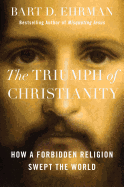
Bart D. Ehrman (How Jesus Became God) has made a cottage industry of writing relatively brief, accessible books about early Christian history. In The Triumph of Christianity, he examines the religion's remarkable success in converting the better part of the Roman world in only a few centuries.
One reason for this was Christianity's exclusivity. Pagan religions did not demand that worshippers of certain gods turn away from others. Ehrman does point to pagan practitioners of henotheism, which lets worshippers focus on a single god without denying the existence of other deities. He suggests that henotheism may have prepared the ground for some Christian converts to recognize one all-powerful God, including, possibly, Emperor Constantine. More importantly, when pagans converted to Christianity, they renounced all other gods. A convert necessarily became an apostate to all of paganism, so that more Christians meant fewer pagans.
Ehrman also writes at length about Christianity as a missionary religion. While pagans had a precedent for monotheism in their Jewish neighbors, "we don't know of any missionary religions in the pagan world." The evangelizing mission of the Christian church was thus "unparalleled and unprecedented."
These are only a few of the explanations for Christianity's success that Ehrman examines. His account is measured and grounded, but nevertheless an astounding tale of a persecuted religion that swept the ancient world with shocking rapidity. Readers are left to judge the benefits and drawbacks of Christianity's triumph for themselves. --Hank Stephenson, bookseller, Flyleaf Books, Chapel Hill, N.C.

